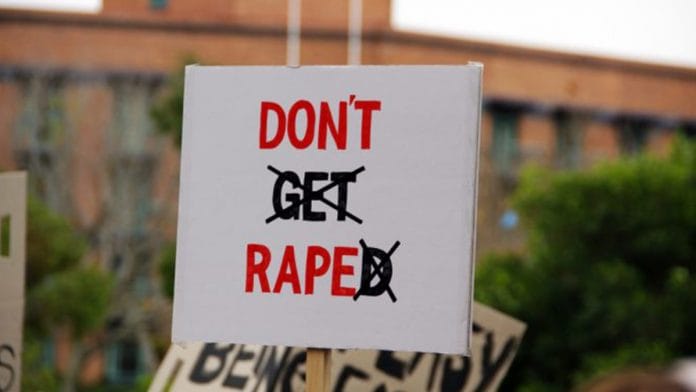It isn’t the khap panchayats that are anti-mobile phones now. It is India’s women’s commissions.
“Girls should not be given mobile phones. They talk on the phone and later elope for marriage,” said Uttar Pradesh women commission member Meena Kumari in a now-viral video about why rape cases were rising. Kumari also called for stricter vigilance of women’s mobility and blamed ‘callous’ mothers who didn’t check their daughter’s phones enough. Only a few months ago, National Commission for Women’s Chandramukhi Devi made headlines for shaming the Badaun gangrape and murder victim. “This incident would not have occurred if the woman had not stepped out of her house alone,” Devi had said. Not surprisingly, both Kumari and Devi withdrew their statements, or said it was misinterpreted when it created furore.
In India, everyone and every frivolous variable is held responsible for rape, except the perpetrator. From Uttarakhand CM Tirath Singh Rawat holding ripped jeans complicit for crimes against women to Haryana khap leader Jitender Chattar saying eating chowmein contributes to rape. No one says men shouldn’t rape. Because as Samajwadi party leader Mulayam Singh Yadav once said, “Boys will be boys, they commit mistakes.”
But this kind of blanket glossing over doesn’t only come from people in powerful positions. The very language around sexual violence — even in the media — is equally threatening to women. Just look at the headlines.
Also read: Goa court’s verdict acquitting Tarun Tejpal like a ‘manual for rape victims’, says Bombay HC
Politics of reporting on rape
Just like laws, our language needs to hold rapists accountable too.
In 2014, as part of a feminist Twitter campaign, ‘Name the Agent’ challenged media coverage of violence against women. News headlines and reports commonly use the passive voice while describing stories of sexual assault — “this or that women was allegedly raped while doing something” — which can come across as attributing the responsibility of the crime on women. Even if it wasn’t the intention of the author or the reporter, putting the accused in the background can evoke misconceptions.
See these headlines:
27-year-old woman locked down, assaulted, raped by live-in partner
Drunk woman left on road after party raped by 2 near Bhankrota
Woman locked up in Kochi flat, raped and assaulted repeatedly
Language plays a major role in constituting our realities. Some researchers say sentences like “she was raped” might hint at the victim’s ‘participation’ in the act or her ‘fault’, parallel to “she got herself raped”. Then, the question of who committed the rape becomes irrelevant. The use of this language in media affects our minds in subtler forms, silently shaping public opinion regarding the rape discourse in India. The only way to resist this is by changing the narrative. What if we wrote “man raped woman after luring her on phone” instead of “woman was raped after talking to a man on phone”. Let’s not render masculine action invisible from the conversation. The perpetrator can’t be a footnote in the story.
Countering rape myths perpetuated by politicians, media and sometimes women’s groups is essential in the fight against victim-blaming and rape culture. We should also appreciate how far we have come when this archaic mindset is actively being negated and held accountable on social media, and other public spaces.
Also read: Rape is born in adolescent minds. But where does it end?
Controlling women
Coming back to the use of phones as the great evil corrupting young women and leading to ‘rapes’. NCRB data from 2019 showed 15.43 per cent of rape victims were below 18 years, with the highest number of crimes against the girl child being reported from Uttar Pradesh. How will the phones account for rapes among minors, those with the least access to them? Or the high rate of incidents in one of the most deprived regions of the country?
The culture of victim-blaming is an extension of patriarchy, which aims to monitor a woman’s body and sexuality — apart from mobility, finances and ultimately, independence. Women’s bodies are regarded as the most prized possession to be controlled by the men in their life, lest it brings ‘dishonour’ upon the family. So women are told to change their behaviour, dress less provocatively, not drink alcohol, or simply avoid putting themselves in a situation that might lead to rape. It’s easier to control them than change.
Views are personal.
Edited by Neera Majumdar.






